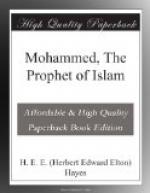“During the stir and activity of the first sixty years, thousands and thousands occupied themselves with handing down traditions. In every mosque they committed them to memory, and rehearsed them in every social gathering. All such knowledge was the common property of the nation; it was learned by heart and transmitted orally. It possessed, therefore, in the highest possible degree, the elements of life and plasticity. Bunson has discovered the divinity of the Bible in its always having been the people’s book. If this criterion be decisive, then no religion has better claim to be called the ‘vox Dei,’ because none is in so full a sense the ’vox populi.’ The creations of the period we have been considering possess this character for hundreds of millions of our fellow men; for modern Islamism is as far removed from the spirit in which the Coran was composed, as Catholicism is from the spirit of the Gospel; and modern Islamism is grounded upon tradition. But in tradition we find nothing but the Ideal, Invention, Fancy, Historical facts, however they may have been floating among the people in the days if Ibn ’Abbas, and the other founders of genealogy, were trodden under feet, because men wished to remove every barrier which stood in the way of self-glorification. And of the thousand inventions which every day gave birth to, only those were recognised as true which most flattered the religious and national pride ...”
He also goes on to say:
“The time of creative activity, the gestation era of Moslem knowledge, passed away. Hajjaj choked the young life in its own blood, and the Abbaside dynasty, with kingly patriotism, sold the dearly-bought conquests of the nation, first to the Persians, and then to Turkish slaves, with the view of procuring an imaginary security for their throne. And thus there arose for the spiritual life also a new period. Already Wackidi had begun to work up into shape the mass of his traditionary stores, and busy himself in the department of scholastic industry. In the schools one could as little affect now the material tradition, or alter its nature, as attempt to change the organism of the new-born child. However arbitrary might be the invention of the ‘Miraj’ (Mahomed’s heavenly journey), and other fabrications of the first century, they still formed in this way the positive element and soul of religious, political and social life. The schools, as always, confined their exertions to collecting, comparing, abbreviating, systematising, and commenting. The material was altogether divine; and any unprejudiced historical inquiry, any simple and natural interpretation of the Coran, any free judgment on tradition or its origin, was condemned as apostasy. The only task that remained was to work up, in scholastic form, the existing material; and in this way was developed a literature of boundless dimensions, which yet at bottom possessed nothing real. The whole spiritual activity of the Mohamedans, from the time of the prophet to the present day, is a dream; but it is a dream in which a large portion of the human race have lived; and it has all the interest which things relating to mankind always possess for man.”
Sir William Muir agrees with these views, subject to two considerations. He says:—




